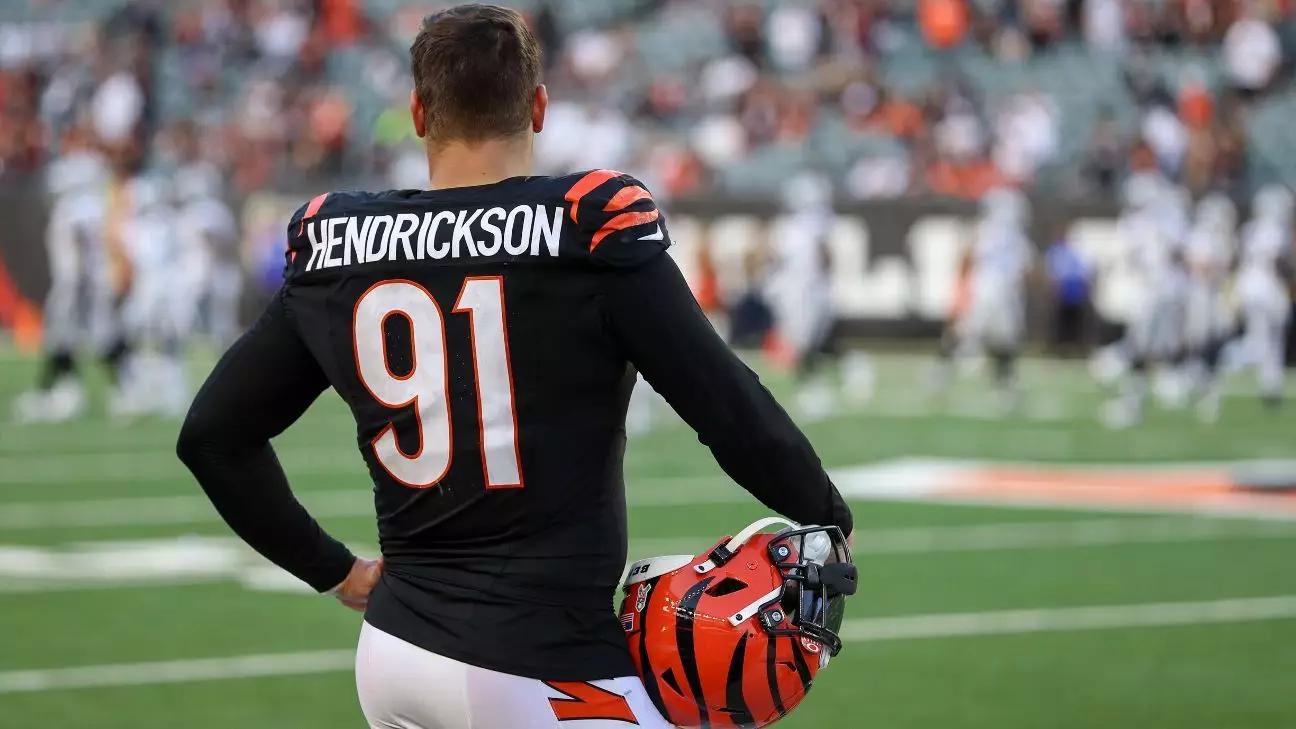Trey Hendrickson, a prominent figure on the Cincinnati Bengals’ defensive line, stands firm in his refusal to play this season, shining a light on deeper issues that have long plagued the NFL: player security and fair contract practices. Hendrickson’s stance is not merely a personal protest but a reflection of a broader desire among NFL athletes to secure guaranteed income, especially after demonstrating elite performance. While the Bengals are willing to negotiate on overall salary and contract length, their reluctance to provide guaranteed money beyond the first season has fueled an impasse. This stance exposes a stark divide between players seeking financial stability and teams’ traditional contractual models that prioritize team control over player security.
Hendrickson’s situation underscores an important tension: talent vs. security. Despite leading the league with 17.5 sacks last season, he remains skeptical of the Bengals’ terms, particularly regarding guaranteed dollars. His decision to sit out illuminates a significant gap in how NFL franchises and players view the value of risk and security. For Hendrickson, the core issue isn’t about fame or accolades; it’s about peace of mind and the reassurance that his efforts translate into enduring financial safety—a value that many NFL veterans now prioritize as their careers evolve.
Performance Meets Principles: The Cost of Emotional and Financial Investment
The fact that Hendrickson is set to earn $16 million this season further highlights the irony of his stance. He’s proven his worth on the field, yet his contractual frustrations reveal a growing friction—players doing everything to perform at the highest level, often at the risk of career-threatening injuries, only to face disputes over the mere security of their investments. Hendrickson’s refusal to participate in practice and his holdout exemplify the financial double standards that still pervade professional football.
What stands out is Hendrickson’s emphasis on personalized security. His comment about wanting certainty “where we’re going to play” underscores a fundamental human desire—control over one’s future. His willingness to sit out demonstrates a level of agency rarely seen in this sport, which is notorious for short careers and little guaranteed income. His stance is provocative, but it raises critical questions: should NFL players accept less, or is it time for the league to recognize that true security must be part of the package? Hendrickson’s stance challenges the status quo, pushing for a shift that could redefine player-team negotiations across the league.
Beyond Individual Dispute: A Signal for League-Wide Change
This contract dispute isn’t just a personal battle; it’s emblematic of a wider movement among NFL athletes. The push for guaranteed contracts is gaining momentum, especially as players like Hendrickson understand their worth and the fleeting nature of NFL careers. His recognition of the importance of security, beyond mere recognition or stats, heralds a broader shift toward prioritizing long-term stability over immediate financial gains.
Furthermore, Hendrickson’s approach—eschewing the typical star mentality to focus on security—may influence future negotiations league-wide. It’s a reminder that players are increasingly aware of their value and are less willing to accept contractual terms that leave them vulnerable. His stance underscores a fundamental truth: football is a brutal sport, and no amount of fame or accolades can guarantee players a secure financial future. As more athletes follow his lead, the NFL could face an overdue reassessment of how it negotiates contracts, ultimately leading to a more equitable balance between team control and player security.
Hendrickson’s stand is a testament to an evolving NFL culture—one that values not just performance, but also dignity, respect, and safety in financial matters. His refusal to play might be controversial now, but it plants a seed for a future where player welfare takes precedence, potentially transforming the league’s approach to contracts in the years to come.


Leave a Reply